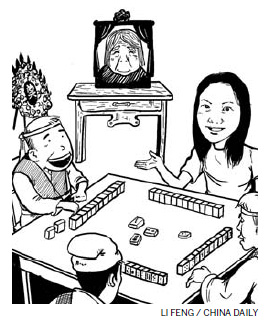It doesn't matter if it's black or white at a funeral
By Luo Wangshu ( China Daily ) Updated: 2011-08-18 13:16:29
I attended an elderly American's funeral with my Japanese friend Taro Yamada in late 2008. He died peacefully in his 90s. His funeral was held in a church in Philadelphia.
It was a severe winter and there was lots of snow. We had a discussion about how to dress the night before the funeral.
"How would you dress in your country?" I asked.
"Mostly in white," Taro said.
"Oh, we do the same." I said.
Taro and I ended up going to the funeral in white. It fitted the weather and occasion, we thought. But it turned out everybody stared at us, as we stood in the group of mourners wearing black.
Taro started to bow to everybody and murmured: "Sorry, I am sorry".
Fortunately, I did not go with a smile. Funerals for those who have lived to a ripe old age and passed away peacefully, in my hometown, Southwest China, are considered to be happy occasions.
There is a Chinese word, xi sang, literally "happy funeral".
Xi sang used to be a popular rural tradition in some parts of China. People of longevity, who have done good deeds in their lives and suffered no diseases, are considered to have lived a full life. Their funerals are often followed by a family banquet.
Recently, when I was sitting in a cafe with my friend Wen Guo, in my hometown of Chongqing. He told me about his grandmother, who just passed away at the age of 104.
The cheerful funeral was arranged according to local tradition.
I was invited to attend. There were more than 100 people in a big hall in the city's funeral parlor. There were at least three or four funerals in the parlor's various halls.
I walked into Grandma Guo's hall. Her body was lying in the middle of the room. People bowed to her and then turned to chat, drink tea and even play poker and mahjong.
The hall was basically divided into two sections - funeral and party. Grandma Guo was lying in a casket, made of well-polished cypress wood, in the funeral section. She was surrounded by bouquets and flowers. She looked full of peace, as if she was in a deep sleep. I detected what I thought was a smile on her face. I was very touched by the respectful atmosphere.
However, when I turned to the other side, the atmosphere was totally different. The party side was filled with laughter, the noisy sound from mahjong games and so on. I felt like it was an adult Disney World.
"Hey, are you able to play mahjong, we lack one." A lady in her 40s asked me. "Oh, come on and join us."
I am not good at it, but I didn't know anyone except Wen and he was busy. I did not want to sit there gazing at Grandma Guo blankly, so I joined the game.
"How do you know Grandma Guo?" I asked.
"Oh, she used to be my husband's primary school teacher. He is busy today and I came for him," the lady said. "Are you sure that you want to play that piece?"
"I'm not good at playing mahjong. By the way, I didn't know that Granny Guo used to be a teacher? Which school did she teach at?"
"Guo? Oh, no. This is Chen's funeral. You might be in the wrong place. No worries, let's finish this round."
In the end, we found that the lady had come to the wrong funeral. She should have been in the room next door. But it didn't stop her playing mahjong all night with Granny Guo's erstwhile family and friends.
|
|
|
|
|
|
|
|


























 Raymond Zhou:
Raymond Zhou: Pauline D Loh:
Pauline D Loh: Hot Pot
Hot Pot Eco China
Eco China China Dream
China Dream China Face
China Face






